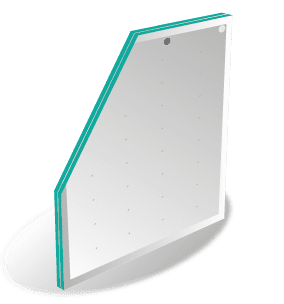
Home Soundproofing and VIG
Discover the key factors influencing acoustic performance in home soundproofing. Compare insulated glass units for noise reduction and choose the right solution for a peaceful, quiet home environment.
Soundproofing Your Home: Understanding the Acoustic Performance of Insulated Glass Units
Welcome to our guide on home soundproofing, where we delve into the pivotal role of insulated glass units (IGUs) in creating a more comfortable living environment. Discover how different IGU configurations contribute to effective soundproofing, empowering you to make informed choices for a quieter and more peaceful home.
In modern architecture, insulated glass units (IGUs) have become the standard choice for windows and doors due to their superior energy efficiency. However, IGUs also play a crucial role in enhancing acoustic performance, reducing noise transmission from outside sources and creating a more peaceful indoor environment.
Factors Influencing IGU Acoustic Performance
Several factors contribute to the acoustic performance of IGUs:
- Glass Thickness: Thicker glass panes generally offer better sound insulation. This is because thicker glass increases the mass of the barrier, making it more difficult for sound waves to pass through.
- Air Cavity Width: The width of the air cavity between the glass panes plays a significant role in sound attenuation. A larger air cavity provides more space for sound waves to dissipate, reducing their overall energy and transmission.
- Glass Type: Different types of glass exhibit varying acoustic properties. Laminated glass, where two or more glass layers are bonded with a polyvinyl butyral (PVB) interlayer, offers superior sound insulation compared to monolithic glass. The PVB interlayer dampens sound vibrations, further reducing noise transmission.
- Gas Filling: Filling the air cavity with a heavier gas, such as argon or krypton, enhances sound insulation. Heavier gases offer greater resistance to sound wave movement, effectively blocking noise penetration.
Read more about Double Glazing.
Comparing IGU Types for Acoustic Performance




Different IGU configurations provide varying levels of acoustic performance:
| IGU Configuration | Description | Sound Transmission Values (dB) |
|---|---|---|
| Single Glazing | Offers the least sound insulation. Sound transmission values typically range from 25 to 30 dB. Often insufficient for noise reduction in areas with significant external noise sources. | 25 – 30 |
| Double Glazing | Standard double glazing with two panes of monolithic glass and a 16mm air cavity. Improved sound insulation with values typically ranging from 30 to 35 dB. Common choice for reducing moderate noise levels. | 30 – 35 |
| Triple Glazing | Features three panes of glass and two air cavities. Provides the highest sound insulation among standard IGU configurations. Sound transmission values can reach up to 40 dB, effective for areas with severe noise pollution. | Up to 40 |
| Vacuum Glazing | Air cavity between glass panes is evacuated and replaced with a high vacuum. Offers the ultimate level of sound insulation as sound cannot travel in a vacuum. Sound transmission values start at 35 dB, rising to 39 dB for a standard LandVac unit. LandVac with a laminated outer layer achieves 41 dB, and additional panes and cavities allow for further increases. Base LandVac unit is comparable to the best triple glazing units, providing exceptional noise reduction capabilities. | 35 – 41 (LandVac: 35 – 41, Laminated: 41 and options for further increases) |
What does a higher dB rating actually mean for you?
A 1 dB change in a sound equates to about a 26% difference in sound energy (remember that a 3 dB difference is a doubling of energy levels). In terms of subjective loudness, a 1 dB change yields just over a 7% change. A 3 dB change yields a 100% increase in sound energy and just over a 23% increase in loudness.
Here are a couple of example situations:
- A basic slim double glazing unit (14mm, 28dB) would increase the noise level by over 75% compared to a basic LandVac unit (8.3mm, 39dB).
- A basic single glazing (4mm, 25dB) would increase the noise level by about 100% compared to a basic LandVac unit (8.3mm, 39dB).
As you can see, selecting the right glazing unit can have a huge impact on the acoustic performance of your windows.
Read more about slim double glazing and vacuum glazing here.

You can soundproof your home with insulated glass units (IGUs). Choose double or triple glazing, opt for laminated glass, and consider vacuum glazing for top-notch sound insulation. Find personalized solutions by consulting a professional. Dive into our guide for detailed insights.
Choosing the Right IGU for Your Needs
The selection of the most suitable IGU for your specific needs depends on several factors, including the level of noise reduction required, budget constraints, and aesthetic considerations. In areas with moderate noise pollution, double glazing with laminated glass can be an effective solution. For areas with severe noise levels, triple glazing or vacuum glazing may be necessary.
Consult with a professional window and door installer to determine the optimal IGU configuration for your home or building, considering your specific acoustic requirements and budget constraints. By choosing the right IGU, you can significantly reduce noise intrusion and enhance the overall comfort and tranquillity of your indoor environment.